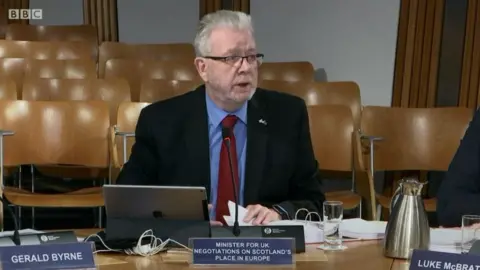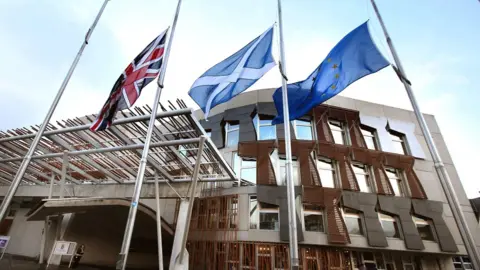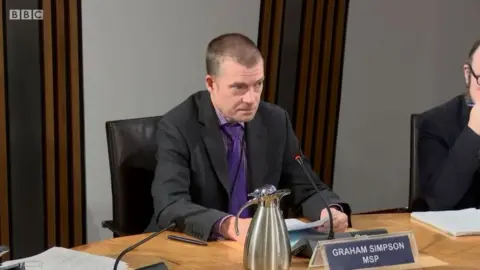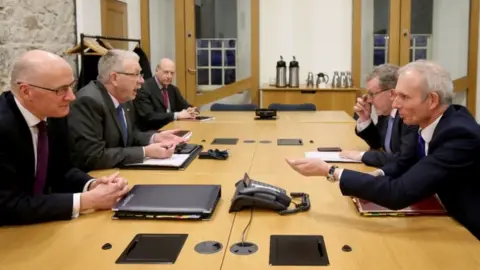Scots minister defends 'significant' Brexit powers plan
 BBC
BBCMinisters have defended the inclusion of "very significant" powers within Holyrood's Brexit continuity bill.
The Scottish government has tabled its own Brexit legislation amid a row with UK ministers over post-Brexit powers.
The Scottish bill mimics the functions of the EU Withdrawal Bill, but adds in extra provisions to help "keep pace" with the EU's laws after the UK leaves.
Scottish Brexit Minister Mike Russell said this "practical" step would be "helpful to a variety of sectors".
However, opposition members said it might look as if ministers were "just looking to frustrate the whole process" of Brexit.
The Scottish government has brought forward the UK Withdrawal from the European Union (Legal Continuity) (Scotland) Bill as the latest act in a row with UK ministers over post-Brexit powers.
If no deal can be struck over how some powers returning from Brussels are distributed into UK-wide frameworks, the Scottish and Welsh governments say they will not put forward Westminster's EU Withdrawal Bill for devolved consent votes.
Both governments have now put forward their own stop-gap legislation to prevent any gaps in the law should the UK legislation ultimately go through without applying to the parliaments in Edinburgh and Cardiff.
The Holyrood continuity bill is going ahead as emergency legislation, and could be passed before the end of March under this accelerated process.
 PA
PAMSPs on the delegated powers committee observed that one section of the bill would give ministers the "very, very significant power" to copy developments in EU law after Brexit - in a way that the EU Withdrawal Bill does not provide for.
Paperwork accompanying the Holyrood bill said this would help Scotland "maintain the regulatory equivalence likely to be necessary to allow Scottish companies to continue to trade with the EU member states".
Mr Russell told the committee that "keeping pace" with EU regulations could be important in some fields, and said he was surprised these powers were not included in the Westminster legislation.
He said: "There were expectations that the UK bill would contain this, so there were circumstances where any administration could say, for example with environmental regulation, we want to make sure that this continues to match, because we don't want this to weaken in any way.
"When we first saw the bill we were very surprised that this was not part of the bill, and we believed that was an ideological decision to prevent this taking place.
"We felt from the beginning that his should be available as an option to ministers with parliamentary scrutiny and approach, and also as a sunsetted option.
"We've introduced this, as the Welsh bill has, to allow ministers to do so in areas of importance."

Mr Russell said there would be "strong scrutiny" of any use of these powers, which would be reviewed every five years, and denied this would stand in the way of Brexit.
He said: "It doesn't keep us in the EU, which was one of the arguments used against this when the UK bill was originally published.
"It's being taken for practical reasons that may be helpful to a variety of sectors. It will be for ministers to take forward proposals, it will be for parliament to accept or otherwise those proposals."
'Keep pace'
Committee convener Graham Simpson asked: "Are you saying essentially that after we leave the EU, you would want Scotland to basically take on board EU laws after that as they change?"
Mr Russell replied: "If there were areas where that were deemed to be appropriate - for example food standards.
"Ninety-eight percent of our food standards legislation comes from the EU. Many people think it would be appropriate to continue to keep pace in changes to European Union law in that area.
"That would be a thing that ministers could bring to the Scottish Parliament and say we would like to do so. It would be for the Scottish Parliament to say yay or nay.
"It is a power that needs to be kept under review, and should be time-limited. The parliament should be able to scrutinise that."
 PA
PALabour's Brexit spokesman Neil Findlay raised questions about the "very significant" powers, saying they might be seen as an attempt to frustrate the process of withdrawal from the EU.
He said: "Someone could be reading that section and say, so they want powers to implement EU law that they like - for five years, but that can continue as long as they want - you can understand why some people would possibly look at this and say, this is just looking to frustrate the whole process."
Mr Russell told him: "I can understand that, but that's not what's in the bill.
"What the bill is saying is that there may be areas where this is useful and extremely important. And in those circumstances, ministers can make a recommendation on that - and if that happens, then that is reviewed every five years and it will cease to happen after five years if that is the view of parliament."
Mr Russell will be in London for further talks with UK ministers in a bid to break the Brexit deadlock on Thursday, and a further meeting is planned for the following week which could involve Prime Minister Theresa May and First Minister Nicola Sturgeon.
Asked about the chances of a deal, which would render the continuity bill surplus to requirements, Mr Russell said he didn't have "confidence either way", saying: "So far, there is nothing I have seen that shows the UK government is moving, but we are still talking."
MSPs will debate the continuity bill in the first of three emergency sessions on Wednesday.
